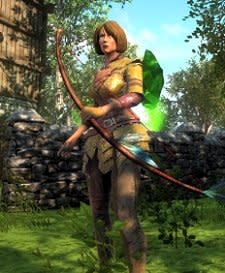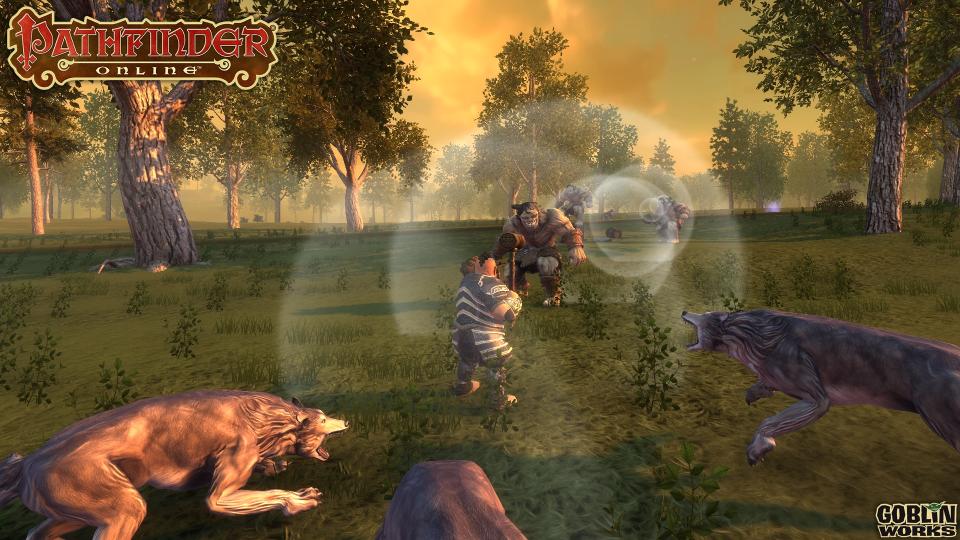Pathfinder Online's Ryan Dancey on early adopter experience bonuses
On yesterday's Massively Speaking podcast, Justin and I discussed Pathfinder Online's plans for granting its earliest and most loyal players what seems to be the ultimate character bonus: an experience edge over everyone else, forever. I'll let the Pathfinder Online dev post Hard is Fun! explain verbatim:
Our game uses a unique real-time based XP system. Characters gain XP through the passage of time, not through being logged in. So the characters that are created in the first month will be the characters with the most XP for all time. A special perk will be in effect that backdates XP to the start of Early Enrollment for the first month so no matter when you purchase an account, if you create a character in Month 1, you'll have that maximum XP.
Usually games with offline experience systems also have either a hard cap or a diminishing returns mechanic to avoid the core "sandbox problem" -- that those who get to the sandbox first perpetually have the most power because they claim all the best toys (and so on). But as written, the Pathfinder Online system seems to exacerbate rather than fix that problem by promising "pioneers" more power in the form of permanently more experience.
Suspecting there was more to the plan, we asked Goblinworks' Ryan Scott Dancey to explain just how it plans to balance its concessions to early backers with its presumed desire to attract newbie players in the more distant future. He's done so, in detail, for us today.
Ryan Scott Dancey, Goblinworks CEO: Our system works essentially the same as EVE Online's, except that in our system you earn XP then spend it, and in EVE's system you pick a skill to train then earn points. Our system works essentially like a bank so you cannot miss any XP as long as you are paying for game time. EVE's system works like a school: If you don't attend (keep your training queue full), you don't get credit and you can lose skill points even if you paid for game time.
To combat the problem of first-in/most-powerful, we have several systems.
First, as in EVE, the power curve is very shallow. The first 6 months are a fairly significant improvement curve, but after that, the incremental increase in power for training higher ranks of Feats slows way down. The difference between a 1-year-old character and a 2-year-old character that trained the same Feats will be much less significant than the difference between a 6-month-old character and a 1-month-old character. Older characters will become more flexible since they will often be trained across many aspects of the game, but in a narrow focus, character power level converges over time.

Second, in order to learn many Feats and many higher ranks of most Feats, the character has to earn Achievements. Currently these are almost all "kill x monsters with y weapon," but the system is designed to enable us to make Achievements for all four of our primary foci: Exploration, Adventure, Development and Domination. Those will be the kinds of iterations very common in Early Enrollment updates. These Achievement "gates" are not designed to feel like grindy treadmills but rather a reflection of the kinds of things characters should be doing as they play normally. They do mean that if someone were to buy an account today and pay for game time for a long time and accumulate a huge bank of XP, they could not cash that all in and go from newb to uber instantly.
Thirdly, and this ties into the second point, a vast amount of character development has not been implemented yet. Nobody can be a Paladin, or a Druid, etc., for example, because we have not iterated on those features yet. When they do get into the game, everyone who wants to be a Paladin or any other new role is going to be on the starting line with everyone else. Some characters may have an easier experience if they are branching an existing character into a new Role, but the Achievement gates and the Role-specific Feat progression will keep all players roughly on the same time line. This also will apply to aspects of the game that have no tabletop counterpart like generalship, market-management, Settlement management, siege warfare, espionage, and so on. We have years of development to go before we begin to run out of low hanging fruit for players to be "first" at.
Fourth and most significant: Characters and Settlements are one system. Your Settlement's development affects what Feats you can train and what ranks of Feats you have trained you can use. This is the biggest game mechanic innovation in Pathfinder Online. Players have to work together and take collective decisions that impact all their characters. Even an old vet with massive XP and lots of trained Feats can lose access to that power if they are severed by war or social action from a Settlement that can support those Feats. Players have to pay as much attention to their shared resource, their Settlement, as they do to their own character sheets. The results of war between Settlements, or decohesion within a Settlement, will have real, meaningful consequences and act as a "catch up" mechanism for younger characters.
There is no way to predict what other systems we will build in the coming years, and I would be foolish to say that our current design is perfect. We are not going to let the game stagnate or degenerate just because some characters are older than others. Our Crowdforgers will have a wealth of great ideas if we need them!
There are some people who cannot tolerate a game where another player has a bigger number on their character sheet and there is no way to close the gap, and those people will have an issue with Pathfinder Online. But the 99% who don't ever play at the "top" of the numbers game won't. I would say that was just a theory, but 10 plus years of EVE Online proves that there is a huge population of people who are not deterred by the numbers game.
He had us at the proper use of the word "foci." (Kidding!) Thanks very much to Ryan Dancey for answering our question in such detail.

When readers want the scoop on a launch or a patch (or even a brewing fiasco), Massively goes right to the source to interview the developers themselves. Be they John Smedley or Chris Roberts or anyone in between, we ask the devs the hard questions. Of course, whether they tell us the truth or not is up to them!


